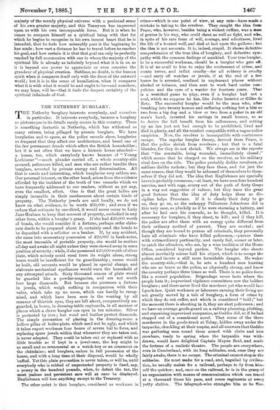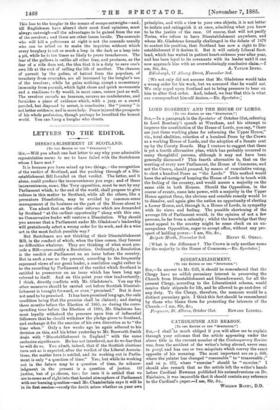THE NETHERBY BURGLARY.
THE Netberby burglary interests everybody, and ourselves in particular. It interests everybody, because a burglary so picturesque in its details rarely occurs in this country. There is something fantastic in Netherby, which has withstood so many reivers, being pillaged by prosaic burglars. We have burglaries and to spare, as the police records show, burglaries so frequent that they affect our architecture, and breed one of the few permanent dreads which affect the British householder ; but it is not often that we have a historic house attacked— a house, too, which everybody knows because of " Young Lochinvar "—much plunder carried off, a whole country-side aroused, policemen killed, and men who are rather bandits than burglars, arrested by private energy and determination. All that is scenic and interesting, which burglaries very seldom are. Our personal interest, on the other hand, arises from the evidence afforded by the incident of the truth of two remarks which we have frequently addressed to our readers, without as yet any, even the smallest, effect. One is that the great ladies are simply incurable in their carelessness about certain kinds of property. The Netherby jewels are said locally, we do not know on what evidence, to be worth 230,000 ; and even if we reduce that estimate by one-third, it would never occur to Lady sane Graham to keep that amount of property, embodied in any other form, within a burglar's grasp. If she had £20,000 worth of bonds, she would consider it a fortune, perhaps order elabo- rate deeds to be prepared about it, certainly send the bonds to be deposited with a solicitor or a banker. If, by any accident, she came into momentary possession of 220,000 in bank-notes, the most traceable of portable property, she would be restless all day and awake all night unless they were stowed away in some position of security ; while, if she possessed L20,000 worth of silver plate, which nobody could steal from its weight alone, strong boxes would be insufficient for its guardianship ; rooms would be built, old servants would be placed in special charge, and elaborate mechanical appliances would warn the household of any attempted attack. Sixty thousand ounces of plate would be guarded like a powder-magazine, and are not worth four large diamonds. But because she possesses a fortune in jewels, which weigh nothing in comparison with their value, which take up no room, which can hardly be recog- nised, and which have been seen in the wearing by all manner of thievish eyes, they are left about, comparatively un- guarded, in boxes, in dressing-table cupboards, in all manner of places which a clever burglar can open in ten minutes. Silver is protected by iron ; but wood and leather protect diamonds. The simple precaution of placing in the dressing-room a hollow pillar of boiler-plate, which need not be ugly, and which it takes expert workmen four hours of severe toil to force, and replacing spare jewels within that whenever they are taken out, is never adopted. They could be taken out or replaced with as little trouble as if kept in a jewel-case, the key might be as small and as ornamental as a watch-key or an ornament on the chatelaine ; and burglars, unless in full possession of the house, and with a long time at their disposal, would be wholly baffled. Yet this plain precaution is never taken, or will be, until everybody who is robbed of unprotected property is fined, say, a penny in the hundred pounds, when, to defeat the tax, the most jealous and persistent care will at once be displayed. Englishmen will lose anything except to the Treasury.
The other point is that burglars, considered as workmen in
crime—'which is one point of view, at any rate—have made a mistake in taking to the revolver. They caught the idea from Peace, who, however, besides being a violent ruffian, was a mat of genius in his way, who could cheat as well as fight, and who, in spite of his rare force of will, courage, and adroitness, lived the life of a hunted wolf, and died at last upon the gallows ; but the idea is not accurate. It is, indeed, stupid. It shows defective comprehension of the true idea of burglary, and defective sym- pathy with the common feelings of mankind. Your true burglar, to be a successful workman, should be a burglar who gets olt. It is of no avail to him to enjoy the excitement of crime, and create terror, and inflict cruelty—for all robbery is cruelty —and carry off watches or jewels, if at the end of a few hours he is arrested, confined in unpleasant places without alcohol or tobacco, and then sent to work hard under com- pulsion and the eyes of a warder for fourteen years. That is a wretched game to play, even if a burglar had not a soul, which we suppose he has, like Judas Isoariot or Gilles de Retz. The successful burglar would be the man who, after breaking into twenty houses and suffering nothing but a bite or two from a big dog and a blow or two from a poker in an old man's hand, invested his savings in small houses, so as to derive the full benefit from his callousness, and setting up an inn just not bad enough to be prohibited, lived and died in plenty, and all the comfort compatible with a vague police suspicion. Now, the revolver is incompatible with continuous escape. The regular burglar theory, derived from Peace, is that the police shrink from revolvers ; but that is a fatal blunder, for they do not shrink. We always see in the reports that " the constable, being wounded, immediately closed ;" which means that he charged on the revolver, as his military rival does on the rifle. The police probably dislike revolvers, as soldiers dislike rockets ; but they face them, and for just the same reason, that they would be ashamed of themselves to them- selves if they did not. The idea that Englishmen are specially brave is probably erroneous,—at least, we have seen four hundred navvies, mad with rage, scurry out of the path of forty Greys in a way not suggestive of valour; but they have the great good fortune that the idea of duty helps them as dis- cipline helps Prussians. If it is clearly their duty to go on, they go on, as the unhappy Policeman Johnstone did in this very case, as pluckily as if he were storming a battery, and after he had seen his comrade, as he thought, killed. It is necessary for burglars, if they shoot, to kill ; and if they kill, the police are after them with an energy quite different from their ordinary method of pursuit. They are mortal ; and though they are bound to pursue all criminals, they personally hate all criminals who have killed policemen,—pursue them with extraordinary pertinacity, and rarely fail, sooner or later, to catch the offenders, who are, by a wise tradition of the Home Office, considered beyond pardon. The burglar who shoots almost inevitably misses half his object, which is to escape the police, and incurs a still more formidable danger. He wakes the country-side,—that is, he sets a hundred men hunting who are as brave as the police, as physically strong, and know the country perhaps three times as well. There is no police force like a roused population. Brigandage never lasts where the people hate it ; improvised vigilance committees cow the boldest burglars ; and there never lived the murderer yet who would face Lynch-law. Quiet workmen or labourers earning their living are not greatly moved by a tale of burglary, a form of crime by which they do not suffer, and which is considered " bold ;" but the moment there is shooting in it, they are alert policemen; and we have an average .goods-guard on a railway planning, plotting, and organising improvised companies, as Geddes did, as if he had stepped out of a sensational novel. That scene of the three murderers in the goods-truck at Tebay, hidden away under the tarpaulin, chuckling at their respite, and all unaware that Geddes was gathering men round them armed with clubs and iron crowbars, ready to spring when the tarpaulin was with- drawn, would have delighted Captain Mayne Reid, and made the fortune of a realistic theatre. The people are everywhere, even in Cumberland, with its long solitudes, and, once they are fairly awake, there is no escape. The criminal cannot stop in the solitudes. He must make for a road, and, beguiled by civilisa- tion, he usually makes for a railroad, perhaps to fly from him- self the quicker; and, once on the railroad, he is in the grasp of an organisation with means of communication which can travel at a thousand times his pace, and rouse regiments at every petty station. The telegraph-wire strangles him ae he flies. This loss to the burglar in the means of escape outweighs—and, till Englishmen have alterel their most fixed opinions, must always outweigh—all the advantages to be gained from the use of the revolver ; and there are other losses beside. The comrade who will kill a policeman at sight is not the comrade usually who can be relied on to make the inquiries without which every burglary is not so much a leap in the dark as a leap into a pit, while he is ton times as likely to prove treacherous. The fear of the gallows is unlike all other fear, and produces, as the fear of a rifle does not, the idea that it is a duty to save one's own life at the cost of selling the life of another. The chances of pursuit by the police, of hatred from the populace, of treachery from comrades, are all increased by the burglar's use of the revolver ; while he gains nothing, except a momentary immunity from pursuit, which light shoes and quick movements and a readiness to fly would, in most cases, secure just as well. The revolver reveals no treasure, secures no confederates, and furnishes a piece of evidence which, with a jury, or a crowd puzzled, but disposed to arrest, is conclusive; the " jemmy " is not better evidence, and is more help. Peace injured the prospects of his whole profession, though perhaps he benefited the honest world. You can hang a burglar who shoots.















































 Previous page
Previous page